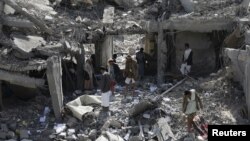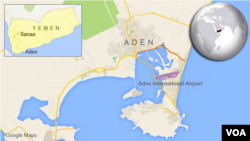There may never be a winner in Yemen’s war, but some groups are already benefiting from the chaos, according to analysts.
Al-Qaida and Islamic State-affiliated militants are attempting to control cities and towns in Yemen, as the Saudi-led coalition moves north, pushing out the Houthi militants, says Yemeni journalist Nasser Arrabyee.
“They are trying to declare emirates in the places where they are strong, where they are familiar,” Arrabyee said on the phone from the Yemeni capital, Sana’a.
Militants in Yemen may not have the power to actually govern these areas, he added, but said they are taking their cues from militants in Iraq and Syria in an attempt to install "Taliban-style" rule.
The groups are also unlikely to capture Yemen’s main cities, he said, because they are unpopular and the cities are protected by an array of militias and militaries. Al-Qaida and IS, as the Islamic State group is known, are currently concentrating their efforts in regions where they traditionally operate, he explained.
Bomb blast
Four people were killed and 11 injured Thursday when a bomb exploded near the governor’s office in Aden, Yemen’s second city, recently recaptured from Houthi militants by forces allied with the returning government in exile.
No one has claimed responsibility for the Aden attack, but Islamic State supporters on Twitter say fighters stormed a military barracks in an unrelated attack near the Saudi border.
This comes as a massive humanitarian crisis pushes Yemen to the brink of famine and aerial bombardments continue. Shortages of food, water and fuel are now commonplace and prices have doubled and tripled, leaving the Arab World’s already poorest country devastated.
Nearly 2 million children are malnourished, according to the World Food Program, and more than half the population doesn’t have enough to eat.
“The damage to Yemen’s next generation may become irreversible,” said Ertharin Cousin, WFP’s executive director in a press release Thursday. “If we don’t reach children quickly with the right food at the right time. We must act now before it is too late.”
Beyond the urgent need to end the conflict for humanitarian reasons, military factors may also be drawing the warring parties back toward the negotiating table, according to Arrabyee. As the Saudi-led coalition moves north, it may be stopped at the capital, which is geographically difficult to invade.
“Sana’a is surrounded by very high mountains in all directions,” he said. “These mountainous places are populated by fighters very loyal to Houthi.”
If the coalition doesn’t invade Sana’a or other territories that have been Houthi strongholds for the more than a decade, they will try to negotiate a way out of the war, according to Yan St.-Pierre, who heads the Berlin-based security firm MOSECON.
“Right now they are turning the tide,” he said. “The question will be: How much will they be able to put increasing pressure on the fortresses of the Houthi in the north, and how will they be able to turn that into a bargaining chip for peace negotiations?”
Previous negotiations have broken down because players on both sides have made mutually exclusive demands. For example, the Houthis refused to lay down their weapons and the Saudis refused to negotiate with the Houthis as long as they were an armed group.
If a peace deal isn’t reached soon, St.-Pierre added, Yemenis can expect long-term insecurity at the hands of al-Qaida and IS.
“They will be the real winners of that conflict,” he said.






